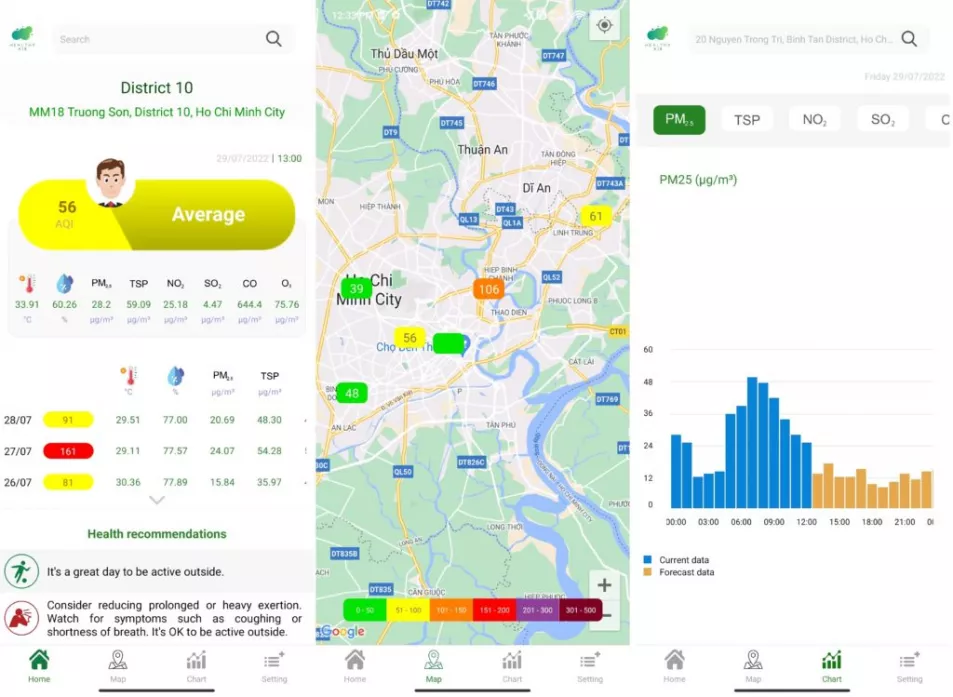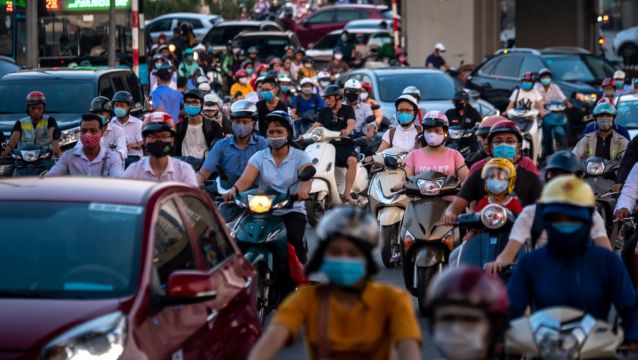CeADAR, Ireland’s centre for applied artificial intelligence (AI), has completed a €350,000 project in Vietnam using AI to track air pollution in its cities and reduce its impact on citizens.
The Healthy Air Project is a collaboration with Vietnam National University and was co-funded by the Irish Research Council (IRC) and Irish Aid. CeADAR, headquartered at University College Dublin, is funded by Enterprise Ireland and IDA Ireland.
The project is using AI and machine learning to reduce the impact of air pollution on residents of Vietnam’s most densely populated cities – including Ho Chi Minh City — where the primary form of transport is the motorbike.
Dr Ricardo Simon Carbajo, director of innovation and development at CeADAR and leader of the HealthyAir Project, told BreakingNews.ie: "Irish Aid and the Embassy of Vietnam helped us to establish links with Vietnam National University, and we found Pofessor Bang who is an expert in air pollution monitoring in Vietnam.
"We talked to him, he ran through the problems Vietnam and other countries have with air pollution."
With a population of almost nine million, Ho Chi Minh City had just one air quality monitoring station, located at the US embassy, prior to the project.
Ireland, with a population of just over five million, has more than 100 air quality monitoring stations.
The project saw six new air quality monitoring stations installed in Ho Chi Minh City.
Dr Simon Carbajo explained: "The data goes to our servers in CeADAR in Ireland in real time, then we use different machine learning algorithms to predict air pollution of different contaminants and pollutants on an hourly basis for the next day.
"It is a 24-hour prediction on an hourly basis. Combining the different pollutant levels, you get the air quality index (AQI).
"If it’s between 0-50 it’s good, Ireland is in this level, after that there is moderate, unhealthy, where it is not safe for people with pulmonary problems to leave the house... and after that beyond 150 it’s problematic for anyone to breath that sort of air.
"We gathered that data, predicted the level of pollution, and forecasted the AQI for the next day.
"We developed a mobile app called the Healthy Air app, anyone can download it, but it particularly applies to people in Ho Chi Minh City.
"They can see what the AQI is and what it will be like hourly in different locations."

Dr Simon Carbajo and his team have spoken about the project with government officials and policymakers in Vietnam, and he said the next step will be expanding the app's use in the wider population.
"It’s available in Android and iOS. People like it so far, but we have been focusing on government officials who can introduce new policy. It has been advertised on national television in Vietnam.
"We haven't run a campaign for the app yet, but we know people are using it. Now we are going to try to reach more citizens, and that’s where I think the most impact will be."
Working with Vietnam National University, Dr Simon Carbajo explained that a paper on potential policies to reduce the air pollution has been created.
One major polluter is the huge number of motorbikes used in the city.
According to a report from the C40 Cities Climate Leadership Group, Ho Chi Minh City’s 8.8 million residents own 7.3 million motorbikes. There are around 7,300 premature deaths each year in Ho Chi Minh due to airborne particles that penetrate deep into lungs, causing respiratory and cardiovascular problems.
The app can help people to reduce the impact of air pollution by avoiding areas where the AQI level is particularly high.
Dr Simon Carbajo explained that weather predictions are used, allowing the AI behind the HealthyAir app to further improve air quality predictions.
He said the project is an example of how interdisciplinary work and international cooperation can have a positive impact on people's lives.
"This project is a good example of what can be done through interdisciplinary and international collaboration to solve a big challenge. I’m Spanish, there was Irish people, Vietnamese people, Indian people, and some other nationalities too with everybody working towards the same goal."
The interdisciplinary team from both CeADAR at University College Dublin (UCD) and Vietnam National University included, Dr Ricardo Simon Carbajo (AI), UCD School of Computer Science, Professor Bang Quoc Ho (Air Quality), Mr Le Van Hinh (Policy), Ms Khue Vu (Air Quality), Dr Thoaitam Nguyen (Air Quality), Dr David Haughton (AI), Dr Quan Le (AI) and Dr Rajnish Rakholia (AI).
Dr Simon Carbajo concluded: "In CeADAR, I have been leading 50 to 60 projects in the last four or five years and collaborate with so many companies which bring real challenges. The Healthy Air project is great because the project has a social impact "







